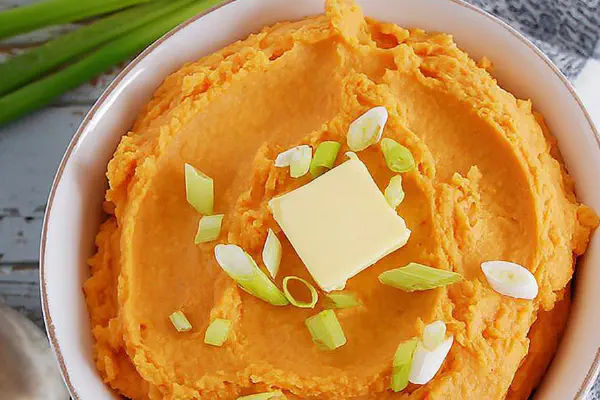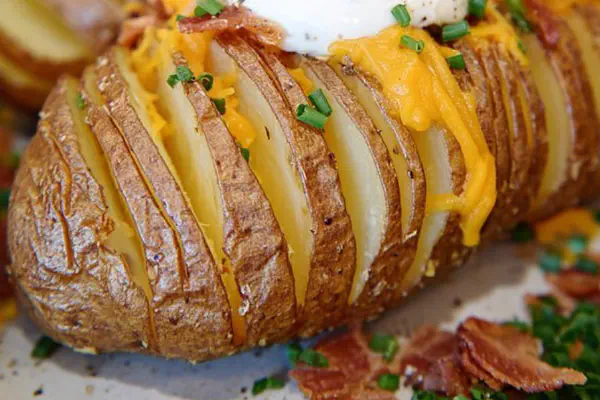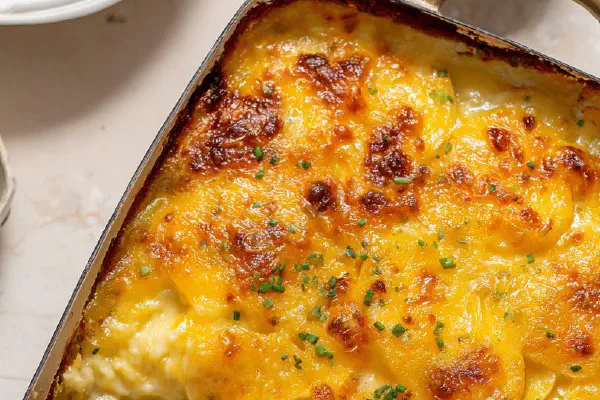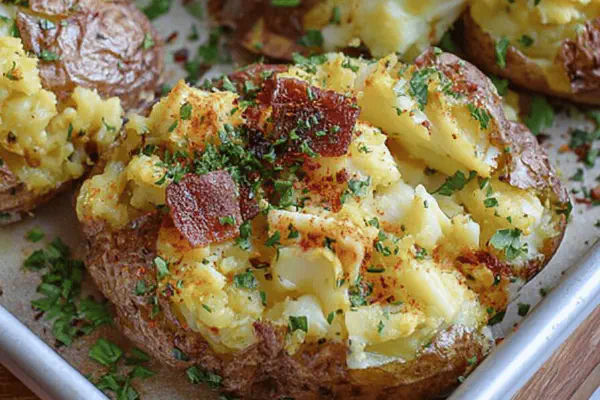Creamy Yukon Mash
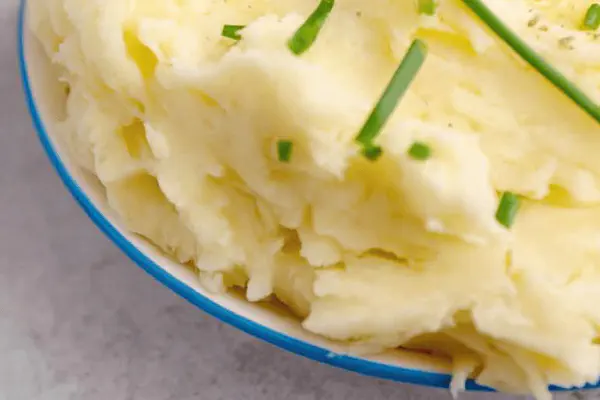
By Emma
Certified Culinary Professional
Ingredients
- 2 1/4 lbs Yukon Gold potatoes quartered unevenly
- Cold water to cover
- 3/4 tsp kosher salt divided
- 1 stick unsalted butter softened
- 1/2 tsp garlic powder
- 1/4 tsp ground white pepper
- 1/2 cup sour cream or creme fraiche
- 1/2 cup warmed whole milk
- 4 tbsp unsalted butter for topping
- 2 tbsp finely chopped fresh chives
About the ingredients
Method
- Start with quartered Yukon Gold potatoes, uneven chunks speed cooking and textural variation. Put in large pot; cover fully with cold water. Add 1/2 tsp salt, swirl to dissolve; this seasons potatoes right from the inside out.
- Bring water up gradually over medium-high heat. Listen to the telltale gentle boil, rolling bubbles with a soft roar. Cook 15-20 minutes. Test with fork. If it slides in without resistance, potatoes are ready—too long and you risk waterlogging.
- Drain immediately, no steaming in colander or they get gummy. Transfer potatoes to a large mixing bowl warmed by hot water (discard before use). This keeps mash fluffy, avoids chilling butter too fast.
- Use hand mixer with beaters, pulse a few seconds to break potatoes up. Don’t overbeat or they turn gluey. Add softened butter, garlic powder, white pepper, and 1/4 tsp salt. Mix on high for 30 seconds—the butter incorporates for richness.
- Add sour cream (or creme fraiche if using; bonus tang). Warm milk gently on stove or microwave—cold milk kills softness. Pour in slowly, beat on high to whip until lumps vanish but don’t go over.
- Drop 4 tbsp butter dollops on top—don’t mix. Let them melt into crevices, shining golden pools of fat. Sprinkle chopped chives right before serving for fresh onion zing and color.
- If too thick, add splash more warmed milk. If bland, adjust salt cautiously. For garlic lovers, fresh minced roasted garlic can replace powder for deeper aroma.
- Leftovers? Reheat gently with splash of milk, stir gently to revive creaminess.
Cooking tips
Chef's notes
- 💡 Chop Yukon Gold potatoes unevenly. Helps steam escape different rates. Textural contrast instead of uniform mush. Potatoes soft inside but hold shape outside. More forgiving than uniform dice. Staggered cook speeds good here.
- 💡 Water starts cold with salt. Salting from start seasons inside. Don’t wait till after cooking—flavor bleeds otherwise. Watch gentle boil bubbles, subtle noise. Fast boil can break potatoes, waterlog. Gentle simmer is key. Fork test, slides clean but resists a bit.
- 💡 Drain fast, no sitting in colander or steam damages texture. Potatoes get gummy if left wet and hot air steams surface. Transfer hot to warm bowl to avoid shock chilling butter. Warm environment keeps mash fluffy, softer.
- 💡 Beat just enough. Overbeating releases too much starch, gluey texture results. Use pulses first to break; mix only once softened butter and spices are added. Butter must be softened but stay semi-solid, or it changes mouthfeel, absorbs weirdly.
- 💡 Warm milk gently before adding. Cold milk stiffens starch molecules, dulls flavor and creaminess. Pour slowly controlled; whip till lumps disappear but don’t beat into glue. Sour cream or creme fraiche adds tang and extra fat layer. Both work well.
- 💡 Leave butter dollops on top, don’t mix in. Melts slow, seals in pockets of fat. Topping texture contrast, look, aroma. Chives chopped at last doesn’t wilt or fade color. Add right before service, freshest flavor pop against creamy base.
- 💡 If mash too thick add splash of warmed milk. If bland, salt cautiously, tiny increments. Fresh roasted garlic can replace powder for deeper aroma. Garlic powder easier, less risk raw harshness. Olive oil swap for butter if dairy-free but changes texture and flavor profile.
- 💡 Leftovers reheat with splash warmed milk in pan or microwave. Stir gently, low heat. Avoid drying out or skillet scraping. Creaminess revives with milk addition, no need to add extra butter here usually. Keep chives fresh and add freshly chopped on service.
Common questions
How to tell when potatoes are done?
Fork should slide in easy without resistance but no mush. Watch simmer bubbles around sides. If fork fights, wait more. Too long makes waterlogged, texture soggy icky.
Can I use other potatoes?
Yukon Gold best for balance waxy and creamy. Russets too mealy, break down much faster. Red potatoes hold shape but less creamy mouthfeel. Adjust cook time if substituting, test often.
Why does mash get gluey?
Overbeat. Starch too released makes gummy paste. Slow pulsing only till chunks break, then add fat and dairy. Too much mechanical action is bad. Use hand mixer low speed or masher for more control.
How to store leftovers?
Cool quickly, store airtight in fridge up to 3 days. Reheat with milk splash, gentle stir. Freeze not ideal; texture changes but could try. Add fresh chives only after reheating, don’t freeze herbs.
